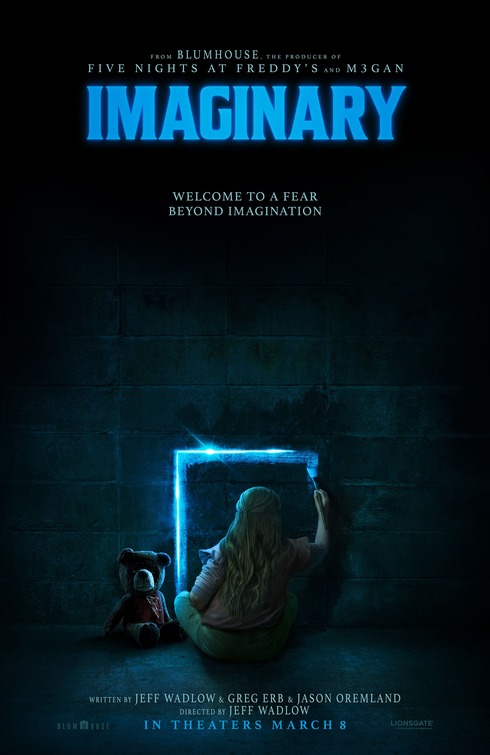
In 2010, reigning horror maven Jason Blum was still a fledgling producer in the genre. While his microbudget approach certainly made some waves with the massive success of PARANORMAL ACTIVITY the previous year, his presence in the genre realm wasn’t firmly entrenched until he ushered James Wan’s INSIDIOUS onto the big screen, essentially proving that he wouldn’t just be a one-trick pony. He was here to stay, and, for the next several years at least, was known exclusively as “the producer of PARANORMAL ACTIVITY and INSIDIOUS. Blumhouse Productions would produce several more hits over the years, but that particular duo has cast a long shadow. They of course inspired a slew of sequels (with INSIDIOUS 5 bowing just last year) but also set the Blumhouse mold: in the years since, the studio has become synonymous with low-budget spook-a-blasts and funhouse freak-outs drawn from a familiar well.
Blumhouse may have grown beyond its reputation as the herald of those pivotal films, whose influence stretched well beyond the studio’s purview, but its productions have rarely strayed too far from the successful formula. Never has that been more evident than it is with IMAGINARY, a movie so utterly familiar and derivative of its Blumhouse forbearers that it almost feels incestuous. With a few tweaks here or there, it could have easily been repositioned as INSIDIOUS: THE BLUE DOOR, a spin-off of Wan and Leigh Whannell’s long-running universe. And while such a formulaic approach has been quite successful for Blumhouse, this outing is a reminder of how uninspiring it can be.
For her entire life, a recurring nightmare has plagued Jessica (DeWanda Wise), an otherwise successful author of children’s books. She’s recently married and has adopted her husband’s (Tom Payne) two children when her father is moved to assisted living, leaving her childhood home unoccupied. Tom sees this as a perfect opportunity at a fresh start and moves the family into the home Jessica was forced to leave as a child due to her father’s mental illness. Indeed, the walls of this house seem to be the very ones that have haunted Jessica’s nightmares, so it’s no surprise when some strange shit starts happening. Namely, younger step-daughter Alice (Pyper Braun) conjures up an imaginary friend, Chauncey, who might not be so imaginary after all. Before long, Alice’s new friend — who takes the form of a teddy bear — has her conducting a demented scavenger hunt that ends with an attempt at inflicting self-harm. Alarmed, Jessica intervenes and begins to discover that her nightmares actually hold the key to unlocking her childhood trauma.
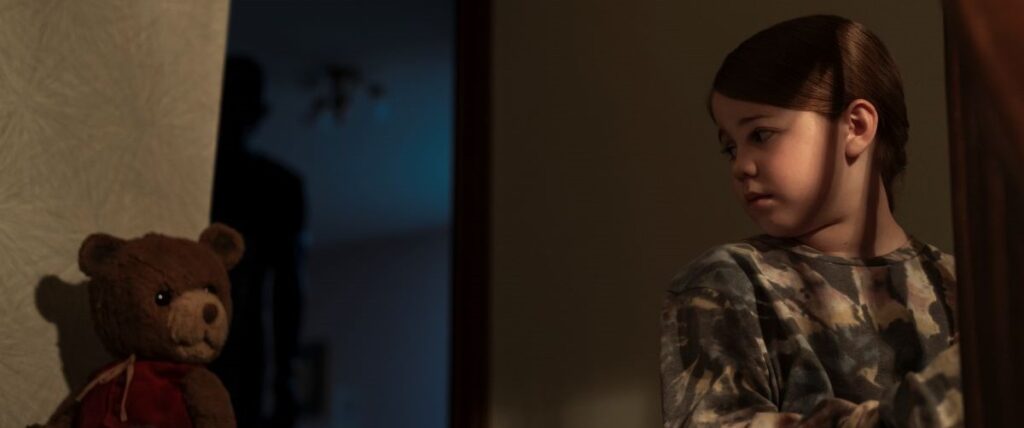
Not that this is ever in question. After all, the film’s first scene finds Jessica creeping through her childhood home, trying to evade some unseen horrific entity that winds up being a giant spider. In addition to getting the film off to a clunky, entirely unsubtle start (where can you possibly go when you’ve already flung a big-ass nightmare spider at the audience within two minutes?), but it also quite literally gives up the ghost. It’s painfully obvious that Jessica’s nightmares are a reflection of the events that drove her father mad, forcing her to go live with her grandmother. We know that Alice’s new imaginary friend Chauncy is Jessica’s old imaginary friend Chauncey — it’s just a matter of how long it’s going to take her to recover those repressed memories. Fret not, though — of course her old babysitter, now an elderly neighbor Gloria (Betty Buckley) is just next door, ready to dump all of the necessary exposition before sticking around to narrate and explain every detail throughout the climax. Gloria embodies one of the biggest issues with IMAGINARY: despite pilfering from plenty of other films, it feels compelled to hold your hand with some of the most egregious exposition in recent memory. Every major plot beat is bolded, italicized, and underlined by Gloria, who becomes a thudding, obvious Greek Chorus to an almost comical degree. Certainly, she’ll be one of the few things I’ll remember from this otherwise forgettable affair.
IMAGINARY emerges as a strange paradox: a movie that’s coasting on familiarity but is so overwrought and overdone that it only adds to the frustration. Not content to hew to an obvious formula, it dives headlong into the formula, embracing every cliche imaginable. It’s not enough that the older, teenage stepdaughter (Taegen Burns) resents Jessica’s intrusion into her life, but she also has to constantly bicker with her during melodramatic encounters — until, of course, she doesn’t. It’s not enough that the boy next door is an idiot bro — he shows up with drugs and goes straight for Max’s unattended booze, all while sneering in contempt at Alice and her imaginary friend (you don’t have to imagine how this exchange ends). It’s not enough that the Exposition Neighbor explains in detail what happened during Jessica’s childhood — we have to witness it as a flashback just before the climax. When Jessica sorts through the mail, it’s not enough that the envelope identifies her address as “Elm Street” — the town is also Springwood, a gusty allusion that does the film no favors.
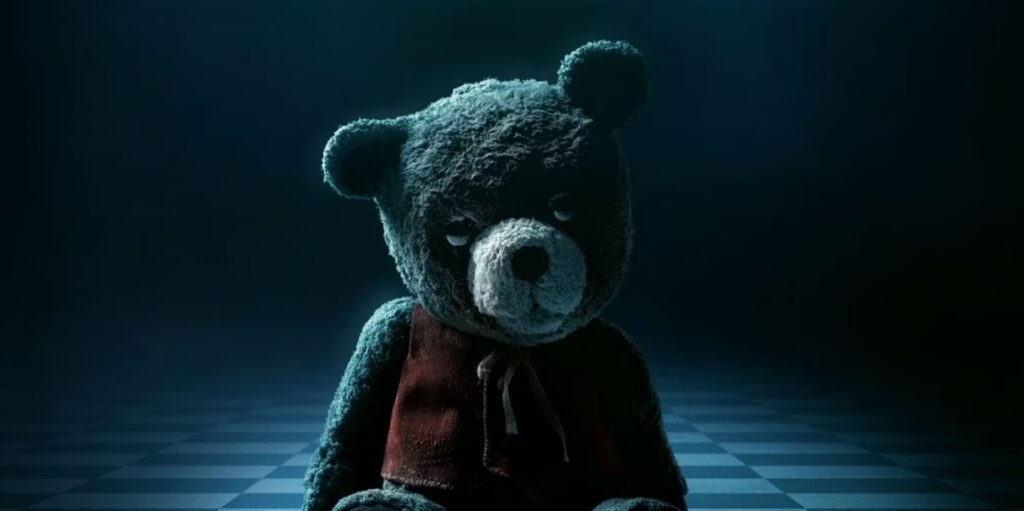
While the NIGHTMARE ON ELM STREET reference is obvious enough (we learn that Chauncey is sort of a reverse Freddy — he allows kids to live in a perfect dream world in exchange for their company), it goes without saying that IMAGINARY does not earn the comparison. Besides, I am not exaggerating when I insist it’s almost a complete rip-off of INSIDIOUS, right down to the characters finding a blue door in the basement that leads to an otherworldly plane of existence where the evil dwells. When you consider just how indebted James Wan was to POLTERGEIST, this starts to feel like an umpteenth-generation copy, its vigor and vitality all dried up from being worn out. If that weren’t enough, Chauncey is interchangeable with any number of generic boogeymen, and his corporeal form — a spider that will drive you insane if you look into his deadlights eyes — will also remind you of a superior story about childhood trauma.
Director Jeff Wadlow has been no stranger to such fare, having helmed TRUTH OR DARE and FANTASY ISLAND, a pair of supernatural features cast in the Blumhouse mold. He has an obvious knack for crafting suspense and scare sequences, something that’s evident even here. What’s frustrating about IMAGINARY is how effective it is at its most primal: even if the trailer completely spoiled two of the film’s more notable sequences, they’re well-orchestrated as Wadlow deftly builds to some effective jolts. One scene in particular involves an unnerving tea party presided over by Alice, Chauncey, and another character whose intrusion into the film is quickly forgotten, another frequent issue with IMAGINARY: once characters have been exploited for scare sequences, they’re mostly inconsequential from that point on. Usually, it’s not entirely a problem if a horror movie deems certain characters disposable, but when it refuses to properly (read: horrifically) dispose of them, it’s disappointing. For all of its effective suspense-building, IMAGINARY struggles with its payoff, killing off only one character, who gets dragged into a room before their (CGI) blood spills under the door. Obviously a film like this doesn’t need to be an absolute bloodbath (POLTERGEIST and INSIDIOUS are exemplary in this respect too), but there’s no sense of genuine menace or peril.
It’s a shame because IMAGINARY boasts some interesting flourishes, starting with its premise: what happens when childhood imaginary friends don’t want to let go? Wadlow (along with co-writers Greg Erb and Jason Oremland) dreams up some fairly evocative lore involving ancient spirits and superstition; of course, he relays it as flatly and as obviously as possible with the revelation that Gloria has dedicated her life to understanding the bizarre events she witnessed during Jessica’s childhood. Likewise, IMAGINARY’s vision of The Other Side/The Further is an MC Escher-style dreamscape with impossibly repeating staircases sprawling into all directions. It also vaguely reminded me of Maggie’s (Lisa Zane) journey into Freddy’s psyche at the end of FREDDY’S DEAD, so maybe it earns that ELM STREET comparison after all.
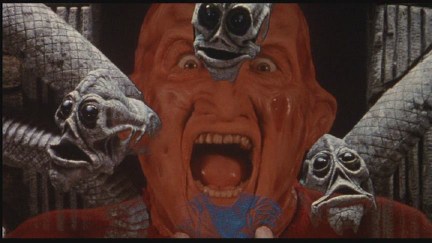
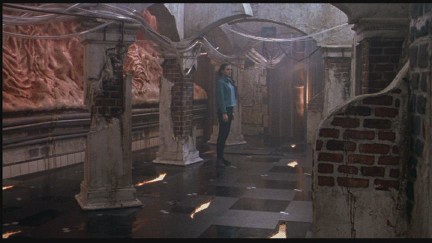
Usually, a film evoking FREDDY’S DEAD would earn a little bit more goodwill from me, but IMAGINARY simply spends too much time reminding you of better movies. Clever homage is one thing — this is one of those cases where you find yourself wishing you could just be watching the stuff this movie evokes. Other, similar films (including this year’s fellow Blumhouse production NIGHT SWIM) thread supernatural horrors through familial drama and do so more artfully and inventively, with more striking imagery and stronger, more affecting performances. With the exception of Wise, the turns are uniformly one-note, overdone cliches, less characters and more like insipid caricatures that keep the audience from investing in the story’s already tepid, predictable drama. Ultimately, IMAGINARY doesn’t flash enough imagination and leaves little to the audience’s imagination, a crippling combination within this genre.
Tags: Bear McCreary, Betty Buckley, Blumhouse Productions, Bono, Dane DiLiegro, DeWanda Wise, Greg Erb, Horror, James McMillan, Jason Blum, Jason Oremland, Jeff Wadlow, Matthew Sato, Mystery, Pyper Braun, Sean Albertson, Sparks & Shadows, Taegen Burns, Teddy Bears, Thriller, Tom Payne, U2, Veronica Falcón



No Comments